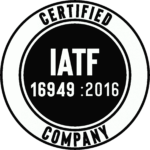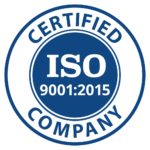Nitriding: Advanced Surface Hardening for Enhanced Durability
At SIMIC Manufacturing, we offer nitriding, a specialized heat treatment process that enhances the surface hardness, wear resistance, and fatigue strength of metals, particularly steels and other ferrous alloys. Nitriding is an ideal solution for components that require exceptional surface durability without compromising their core toughness. This low-temperature process forms a hard, wear-resistant surface layer, providing increased longevity and improved performance in demanding environments.

The Nitriding Process
Nitriding is a form of surface hardening that involves diffusing nitrogen atoms into the surface of a metal at a relatively low temperature, typically between 500°C and 550°C. The nitrogen reacts with the metal, forming a hard compound layer (usually iron nitride) on the surface. This compound layer significantly improves the wear, corrosion, and fatigue resistance of the component.
There are two common methods of nitriding: gas nitriding and ion nitriding (plasma nitriding).
Gas Nitriding: In this method, the metal component is heated in a controlled environment, usually in a gas or salt bath, where nitrogen-rich gases (such as ammonia) are introduced. The nitrogen atoms diffuse into the metal surface to form a hard nitrided layer. This process is ideal for components that require enhanced wear resistance and corrosion resistance, with minimal distortion.
Ion Nitriding (Plasma Nitriding): This is a more advanced form of nitriding where the metal part is placed in a vacuum chamber and subjected to an electrical field. This electrical field ionizes nitrogen gas, creating nitrogen ions that are accelerated towards the surface of the metal. Ion nitriding operates at a lower temperature compared to gas nitriding and can be more precise, making it ideal for high-precision components that require a thinner, more uniform nitrided layer.
Key Steps in Nitriding:
Heating: The metal component is heated in a controlled environment, usually in a gas or salt bath, where nitrogen-rich gases (such as ammonia) are introduced. The metal temperature is kept relatively low compared to other heat treatments to prevent distortion and preserve dimensional accuracy.
Nitrogen Diffusion: The nitrogen atoms penetrate the surface of the metal, reacting with the iron or other alloy elements to form hard nitride layers. The depth of the nitrided layer depends on the duration and temperature of the process, allowing manufacturers to tailor the hardness properties for specific applications.
Cooling: After the nitriding process, the component is allowed to cool slowly, allowing the surface to stabilize and achieve maximum hardness.
Benefits of Nitriding
- Increased Surface Hardness: Nitriding creates a hard, wear-resistant surface layer that significantly improves the material’s ability to resist abrasion, erosion, and galling.
- Improved Fatigue Resistance: The nitrided layer provides better resistance to fatigue, making components less prone to cracking or failure under cyclical loading conditions.
- Enhanced Corrosion Resistance: The nitrided surface layer also enhances corrosion resistance, especially in aggressive environments like high-temperature or chemical exposure applications.
- No Distortion: Unlike other surface hardening methods such as carburizing or induction hardening, nitriding occurs at relatively low temperatures, which minimizes distortion or dimensional changes, making it ideal for precision components.
- Improved Lubricity: The nitrided surface has excellent lubricity properties, reducing friction and enhancing the lifespan of components in contact with other surfaces.
- Reduced Wear and Tear: Nitriding significantly extends the lifespan of components subjected to high wear, making it an ideal choice for parts in high-stress, high-usage applications.
Applications of Nitrided Components
Nitriding is commonly used for components in industries where surface wear and fatigue are critical factors. Some popular applications include:
- Automotive: Gears, shafts, camshafts, crankshafts, and other high-performance components are nitrided to improve their wear resistance and fatigue strength.
- Aerospace: Aircraft engine components, gears, and landing gear parts benefit from nitriding to enhance surface durability and fatigue resistance under extreme conditions.
- Industrial Machinery: Parts like valves, pistons, and tool steel used in manufacturing equipment are nitrided for improved performance and longevity in heavy-duty applications.
- Cutting Tools: Drills, milling cutters, and other tooling components benefit from nitriding, as it enhances their wear resistance and cutting efficiency.
- Oil & Gas: Components exposed to high pressure and abrasive environments, such as valve seats and drill bits, are often nitrided for superior durability and resistance to corrosion and wear.
How to Test Nitriding Parts?
To ensure the effectiveness of the nitriding process, various tests can be conducted on the treated parts:
- Hardness Test: The surface hardness of nitrided parts is typically measured using methods like Rockwell or Vickers hardness testing. The hardness of the nitrided layer should be significantly higher than that of the base metal.
- Microstructure Analysis: Microscopic examination can reveal the depth and uniformity of the nitrided layer, and ensure that the metal has been adequately nitrided.
- Wear Resistance Test: Nitrided parts can be subjected to wear tests (such as a pin-on-disk test) to assess the wear resistance of the treated surface.
- Corrosion Resistance Test: A salt spray test or other corrosion tests can verify the enhanced corrosion resistance of nitrided components.
Why Choose Nitriding at SIMIC Manufacturing?
At SIMIC Manufacturing, we offer precision nitriding services tailored to meet the specific requirements of your components. Our nitriding process ensures that your parts gain superior hardness, wear resistance, and corrosion protection, which is crucial for high-performance applications across various industries.
Our team of experts understands the intricacies of nitriding and ensures that every part undergoes a controlled process to achieve optimal results. We are committed to delivering high-quality, durable parts that perform reliably under even the most demanding conditions.
Contact SIMIC Manufacturing
For more information on our nitriding services or to request a quote, please contact SIMIC Manufacturing today. Let us help you enhance the durability, performance, and longevity of your components with our advanced heat treatment solutions!



